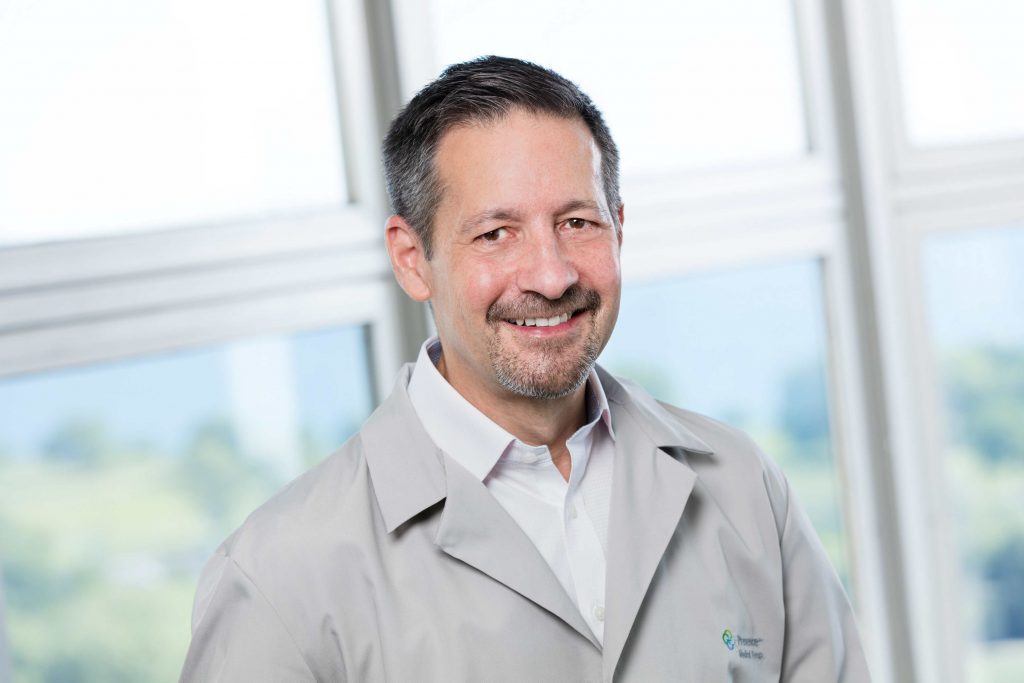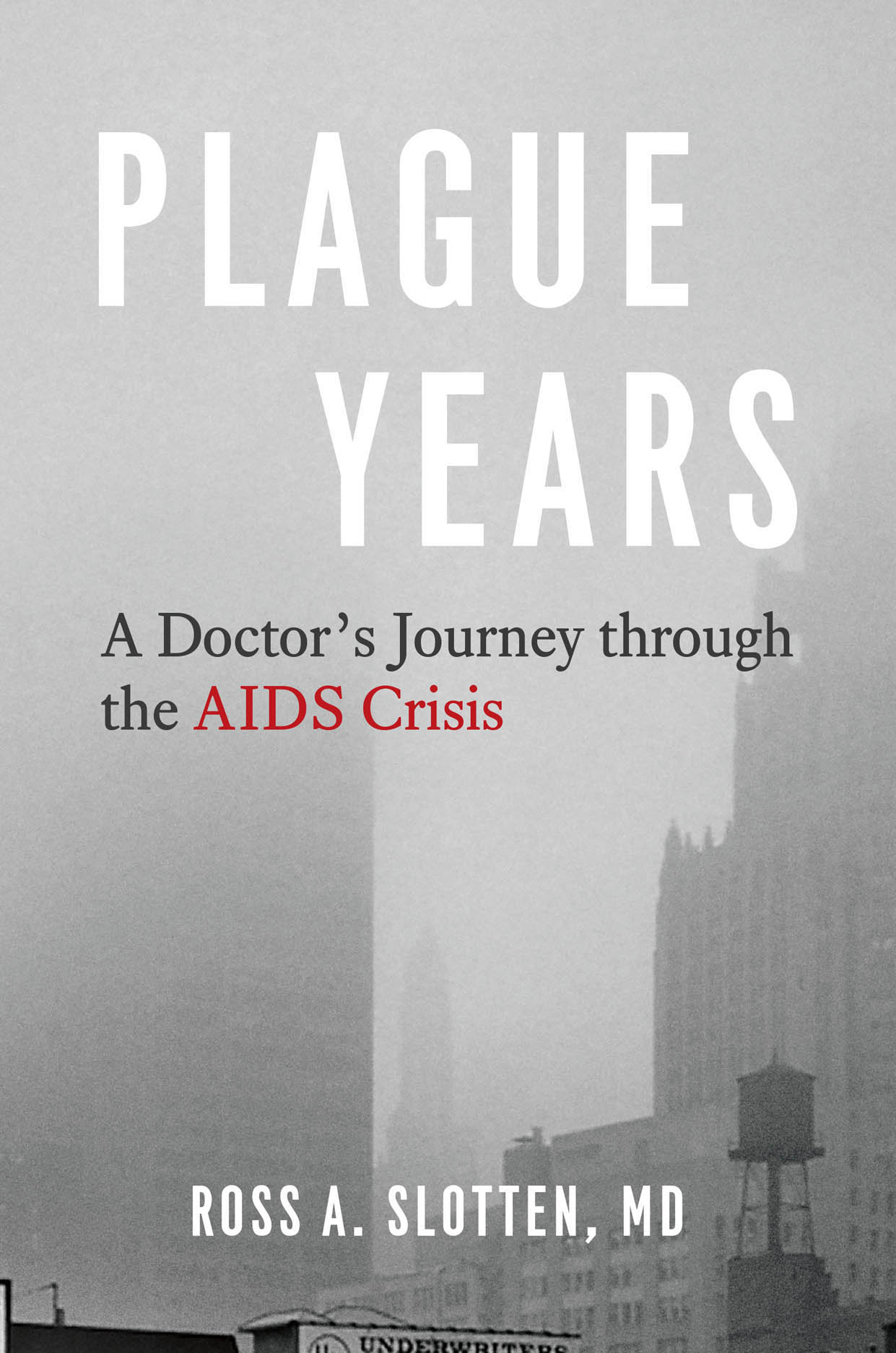Read an Excerpt from “Plague Years: A Doctor’s Journey Through the AIDS Crisis”
Plague Years is an unprecedented first-person account of the AIDS epidemic. Physician Ross Slotten provides an intimate yet comprehensive view of the disease’s spread alongside heartfelt portraits of his patients and his own conflicted feelings as a medical professional, drawn from more than thirty years of personal notebooks. In telling the story of someone who was as much a potential patient as a doctor, Plague Years sheds light on the darkest hours in the history of the LGBT community in ways that no previous medical memoir has.
His moving memoir ensures that these dark hours will not be forgotten, and in honor of Pride Month, we’re sharing an excerpt from the opening chapter.
In the beginning Tom and I weren’t the only AIDS doctors in town. There were a handful of others, like the two Davids at Illinois Masonic Hospital, Bernie B. at Rush, Tom C. at Northwestern, Michael B. at Weiss Hospital, and a few others who didn’t survive the early days of the epidemic. As gay men, we felt that it was our duty to serve the gay community, which bore the brunt—and continues to bear the brunt—of the AIDS crisis, not only in Chicago but elsewhere in the United States, for two-thirds of people with HIV in this part of the world were and are gay men. Although Chicago is a segregated city—a white North Side and black South Side—AIDS in the 1980s was not a North Side–South Side issue. In the close-knit gay community, patients of all ethnicities and races from every neighborhood found sympathetic, dedicated gay doctors to care for them. Although we also treated small numbers of heterosexual patients who’d acquired HIV through intravenous drug use or blood transfusions, as well as women who’d contracted HIV from a bisexual partner, their numbers paled in comparison to the number of HIV-infected gay men. We didn’t turn away those who weren’t gay, but most HIV-infected heterosexual men and women knew nothing about our office and wound up elsewhere, like Cook County Hospital, where our good friends Ron S. and Renslow S. had set up a clinic and the city’s first AIDS unit.
Tom and I might never have become AIDS specialists had St. Joe’s employed a full-time infectious disease expert in the critical years between 1984 and 1986. The absence of such a specialist forced us to learn how to diagnose and treat the ailing men who streamed into our practice as best we could. By 1986 St. Joe’s had hired Roberta L., an infectious disease specialist who became a dear friend and fellow combatant in this hideous war, but by that time we’d embraced our role as pioneers in a new field of medicine and no longer needed to refer patients to a specialist. In 1992, as I wrote those entries in my journal, I had the dubious distinction of having signed more death certificates in the city of Chicago—and by inference the entire state of Illinois—than any other physician. How many deaths had I witnessed; how many more could I withstand before breaking down?
I had no answers to such questions. In fact, such questions eluded my mind that morning in September as I finished my rounds, recorded my observations and recommendations in my patients’ charts, and returned to the elevators without acknowledging the beautiful urban landscape outside the windows. Lost in thought, I descended to the first floor, stored my gray coat in a locker in the doctors’ lounge, chatted with colleagues, exited the hospital for the garage, slipped into my car, and headed to my office. But once in the car, with a few moments alone, the enormity of what I’d confronted tormented me.
How close we always are, I think, to death, I wrote that day, recording what I felt as I drove through neighborhoods where people went about their business seemingly untouched by the AIDS epidemic. They hadn’t the slightest inkling of what my patients and I were experiencing—they lived in a different world from mine, oblivious to the humanitarian catastrophe at their doorsteps. I live life as if the precipice is continually on one side of me. One step and I’m over and done with. Often I have that same sensation you have when you are on top of a mountain, looking over the edge. An invisible force presses against you, to keep you from falling. A momentary vertigo as you fathom the abyss. That thrill of being so close to death. Yes, a thrill, which is the obverse of fear. Your breath stops mid-way. What keeps me from throwing myself off? I wonder. All these feelings are encapsulated in the moment when I ponder death and I think of my patients dying. That force against my chest, that abrupt halting of the breath.
Sometimes I wondered what kept me from throwing myself off the precipice, either literally or figuratively. Perhaps it was my idealistic sense of duty and refusal to abandon my community during its darkest hour; or the adrenaline rush I experienced from being at the forefront of a new field of medicine, which exaggerated my importance in my own eyes and the eyes of my patients and colleagues; or the instinctive drive for self-preservation, which prevented me from having a nervous breakdown or, worse, committing suicide; or simply inertia, because maintaining the status quo, terrible as it was, seemed less frightening to me than change, such as pursuing a different career in medicine. Questioning motives sows doubt; doubt leads to indecision; and indecision to inaction, the worst possible response to a crisis, especially for a doctor. So I simply did not question my motives.
Others might have turned to a pastor or rabbi to address such quandaries, but religion was a foreign language I never learned. Synagogues, mosques, and churches didn’t (and still don’t) inspire feelings of reverence in me, although I respect those for whom they do. When seated in a pew or temple chair, I feel like a trespasser or tourist. Although my parents identified as Jews, they didn’t practice any sort of religion; they described themselves as agnostics. My mother skipped Hebrew school classes and intercepted letters to her parents reporting her truancy until an older sister ratted on her. After his bar mitzvah, my father stopped going to synagogue. My mother eventually explained to me that she didn’t feel comfortable compelling us to do something she didn’t do or, as in my father’s case, did reluctantly. As a result I grew up an atheist whose moral compass was defined not by religious dogma but my parents’ moral code, which essentially adhered to the Golden Rule but without an angry God to reinforce it.
Each day of my life during those dark times, I searched for some way to move forward. Days spilled into weeks, weeks into months, and months into years as the AIDS epidemic ground on. I wasn’t the only one grappling with these issues. There were tens of thousands of us throughout the country and world: public health officials; scientific and clinical researchers; doctors, nurses, physician assistants; and other caregivers, all of us dedicated to a single cause. We intersected at international, national, and local conferences, creating a network that laid the groundwork for finding some solution to the AIDS crisis, of whatever form. When that crisis would end, and how we would survive emotionally and professionally in the intervening time of uncertainty, none of us could fathom.

Ross A. Slotten is a family practitioner specializing in the care of people with HIV/AIDS. He lives in Chicago with his husband and is the author of The Heretic in Darwin’s Court: The Life of Alfred Russel Wallace.
Plague Years is available from our website or your favorite bookseller.
